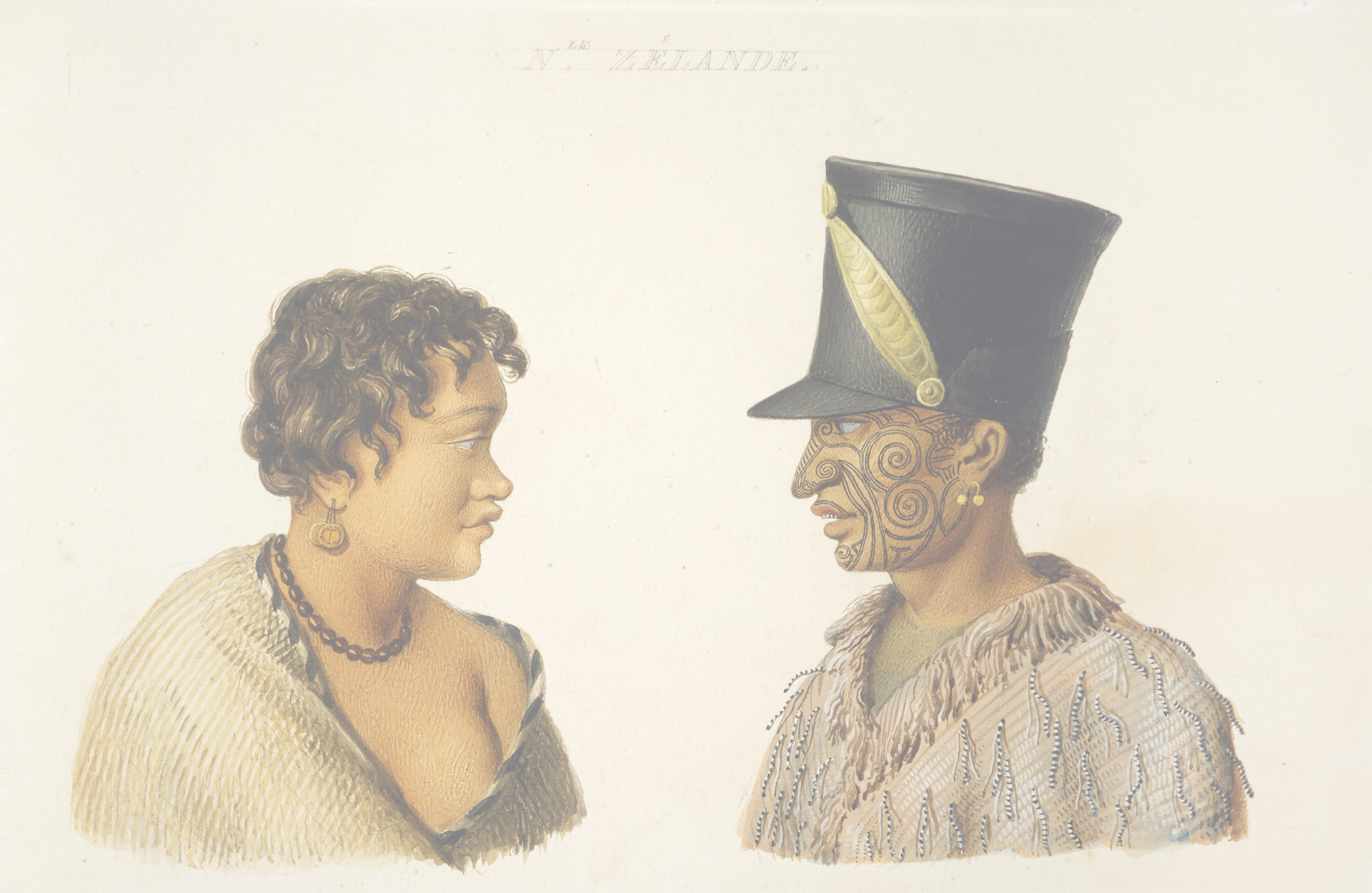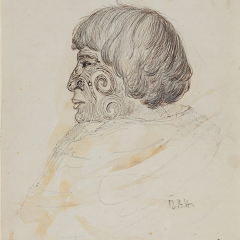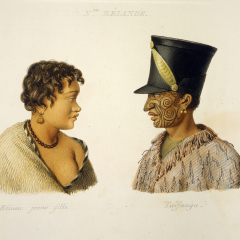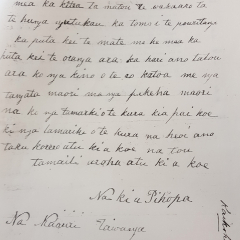I am Rāwiri
Rāwiri Taiwhanga
?-1874
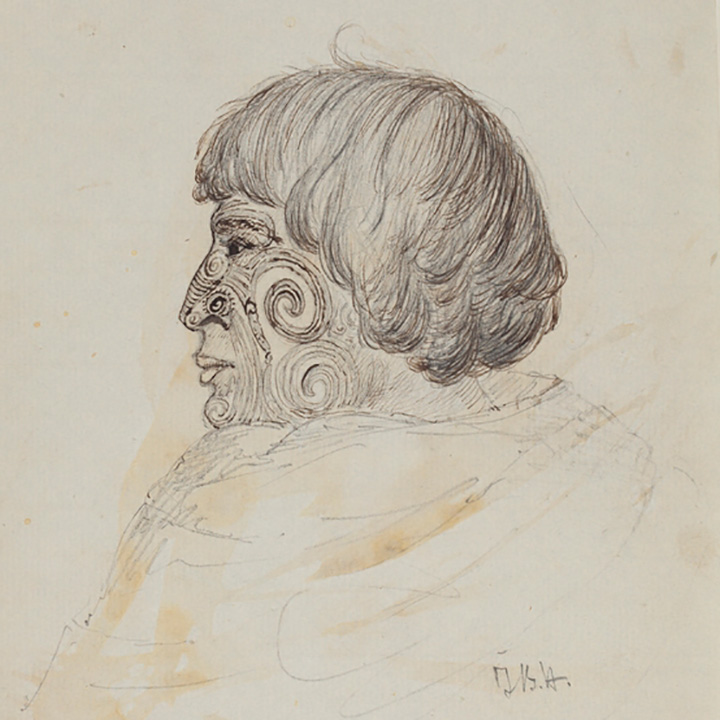
I am Rāwiri
Rāwiri Taiwhanga
?-1874
Hapu
Ngāti Tautahi of Te Uri-o-Hua
Iwi
Ngāpuhi
Mahi (Work)
Rangatira, missionary, teacher, farmer
Tell us about your early life…
I do not know when I was born in terms of the years since our Lord’s birth “A.D.”. When I died in the 1870s, however, some Pākehā thought I was 100 years old. Ihowa (Jehovah/God) certainly rewarded me with a long life.
I was descended of a chiefly line and was heavily marked with the moko. I was steeped in the arts of war and fought with Hongi Hika on his southern raids. Around 1818, we travelled down the East Coast as far as Tokomaru, where we captured a hill-top pā by setting fire to the palisade defences. I was with Hongi again, in 1825, when we avenged the deaths of Hongi’s brothers from years earlier at the battle of Moremonui. This time we were victorious over Ngāti Whātua at Te Ika-a-ranga-nui. The slaughter near Mangawhai was great.
It was different in those times. Now, I do not glorify war. It is bloody practice; a life-diminishing way. But God’s ways are mysterious, for a war expedition brought me my wife Māta Rawa, of Te Arawa blood. Our party had pursued the enemy from the fight at Mangawhai all the way to Rotorua. There I killed Māta’s husband and two children and took her back to Ngāpuhi, where she became my wife.
Only after that did I abandon warfare and follow Ihi Karaiti (Jesus Christ) and his new way of forgiveness and peace. My wife was baptised Māta (Martha) and myself Rāwiri (David).
What were your life’s achievements?…
I associated myself with the Church Mission and became a successful farmer. Some say I was the first commercial dairy farmer in New Zealand because I produced and sold butter to a merchant in the Bay of Islands.
But I was not successful because I sat on my hands. I worked hard. As the saying goes ‘tama tu tama ora, tama moe tama mate’ (stand and live, sleep and die). I was a foreman at the Kerikeri mission farm; in 1822-24, I stayed with Samuel Marsden in Parramatta, New South Wales, advancing my knowledge of agriculture and trades; then I was a sawyer at the Paihia mission. All this time, I was learning the arts of reading and writing; I even became a monitor at the Paihia school.
I started my own farm east of Kaikohe, running cattle and sheep and producing butter. I built myself a weatherboard house both at Paihia and on my Kaikohe land.
When Henry Williams and Thomas Chapman took te Kupu a te Atua (the Word of God) to Tauranga and Rotorua in 1831, I guided them and explained to the people – some of my wife’s relations – the purpose of our mission.
Toughest challenge?…
My lifetime spanned the tumultuous period of the musket wars, through the adoption of the first New Zealand flag in 1834, He Whakaputanga o te Rangatiratanga (Declaration of Independence) in 1835, and then acceptance of the Queen’s Governor in 1840 to bring law and order.
I am saddened that we were fighting each other within a few years of that covenant or te Tiriti (the Treaty): British against Māori, British and Māori against Māori. Everyone has their own reasons for doing things, whether fighting or not, but I always yearned for the peaceful way after my baptism.
My son, Hirini (Sydney), took up the new challenges of his generation, striving to make sure the Treaty was honoured by the Government. He eventually became an M.P. for Northern Māori, but struggled to get traction there.
I am also deeply saddened at the way we lost possession of our land and taonga so quickly, and became impoverished, without capital. I thought I was showing a new way in the 1830s-40s, but that new way did not seem to lead to much prosperity for the wider hapū and iwi of Ngāpuhi, or the native people (Māori) in general. I try not to blame anyone solely for this: the Crown, the Pākehā, the Church, or hapū/iwi themselves. They probably all share some responsibility.
What is your closing message for us?…
I wrote to Bishop Selwyn more than once in the 1840s asking for copies of the Prayer Book – Te Rāwiri. It might be something to do with my name, or the waiata (Psalms) of the original Rāwiri (David), but something has always stirred in me when I hear Hebrew songs and chants. They speak of God and his people, his divine choice to place them in a good land. They tug on my heart strings even today. I believe our peoples – Māori, Pākehā, tauiwi – should remember them again.
Ka korero ahau i tou ingoa ki oku hoa: ka wakapai atu ahau ki a koe i waenganui o te wakaminenga.
I will declare thy Name unto my brethren; in the midst of the congregation will I praise thee.
E koutou, e te hunga e wehi ana ki a Ihowa, wakapai atu ki a ia; wakakororiatia ia e koutou, e te uri katoa o Hakopa; kia wehi ki a ia, e koutou katoa, e te uri o Iharaira…
O praise the Lord, ye that fear him: magnify him, all ye of the seed of Jacob, and fear him, all ye seed of Israel…
E mahara nga pito katoa o te ao, a ka tahuri atu ki a Ihowa: a ka koropiko nga hapu katoa o te iwi ki tou aroaro.
All the ends of the world shall remember themselves, and be turned unto the Lord: and all the kindreds of the nations shall worship before him.
(Psalms 22: 22-23, 27)
REFERENCES
Book of Common Prayer and Nga Waiata a Rawiri (the Psalms), 1840 edition.
Rawiri Taiwhanga to Bishop Selwyn, letters of 1846, 1848, other date(s), ANG 90/4, Kinder Library, St John’s College, Auckland.
Claudia Orange and Ormond Wilson. ‘Taiwhanga, Rāwiri’, Dictionary of New Zealand Biography, first published in 1990, Te Ara – the Encyclopedia of New Zealand, https://teara.govt.nz/en/biographies/1t4/taiwhanga-rawiri (accessed 30 November 2020).
Written by S. Carpenter. © Karuwhā Trust 2020
Note: this interview style ‘autobiography’ has been written based on historical data and all quotations are from actual archival documentation or (occasionally) family oral tradition; artistic or interpretive license has of course been taken with the style or ‘voice’ of the subject person. References are given for further reading and research purposes.
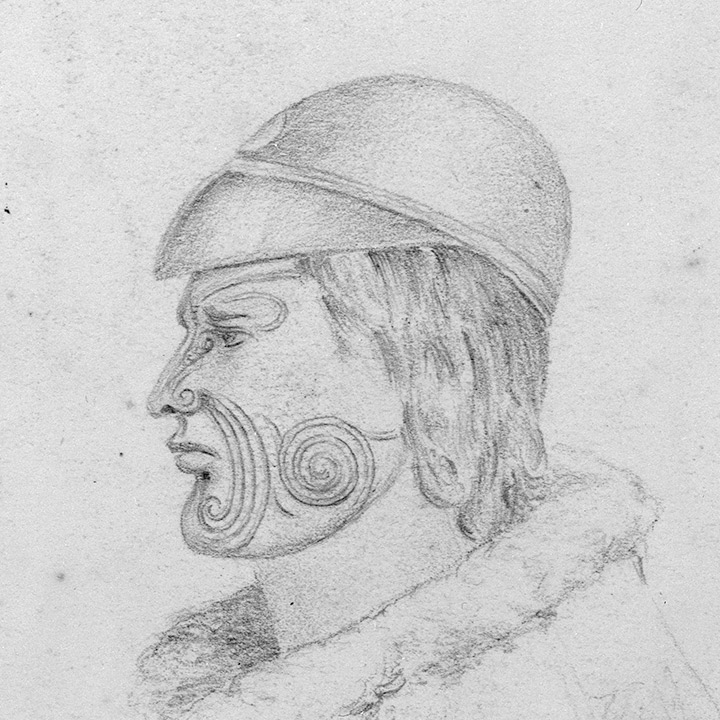
Hone Heke
“I was born at Pākaraka, near the maunga Pouērua, inland from Pēwhairangi – what the Pākehā call the Bay of Islands. I was given the name Pōkai after my mother’s brother...”
Read more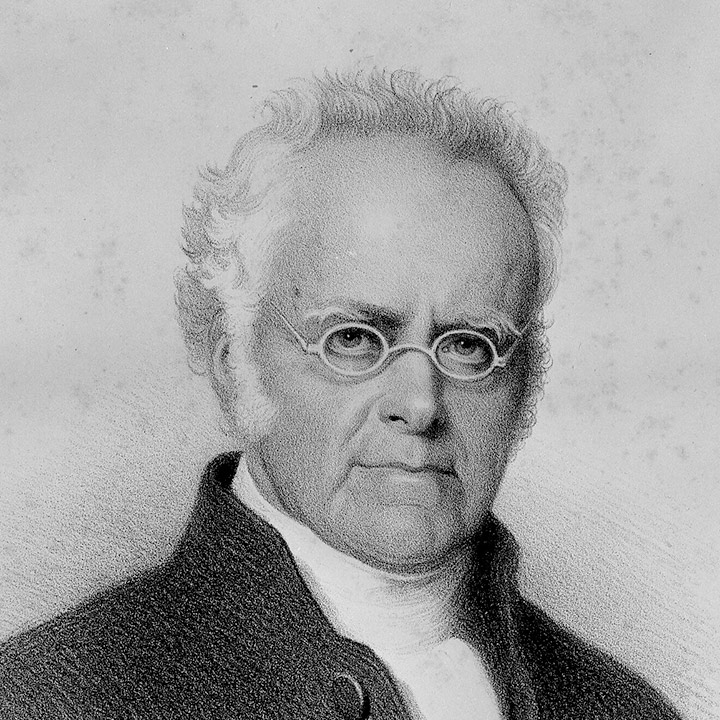
Henry Williams
“I was born in 1792, in Gosport, south England, near Britain’s main naval base at Portsmouth. My parents were Thomas Williams, a hosiery merchant, and Mary...”
Read more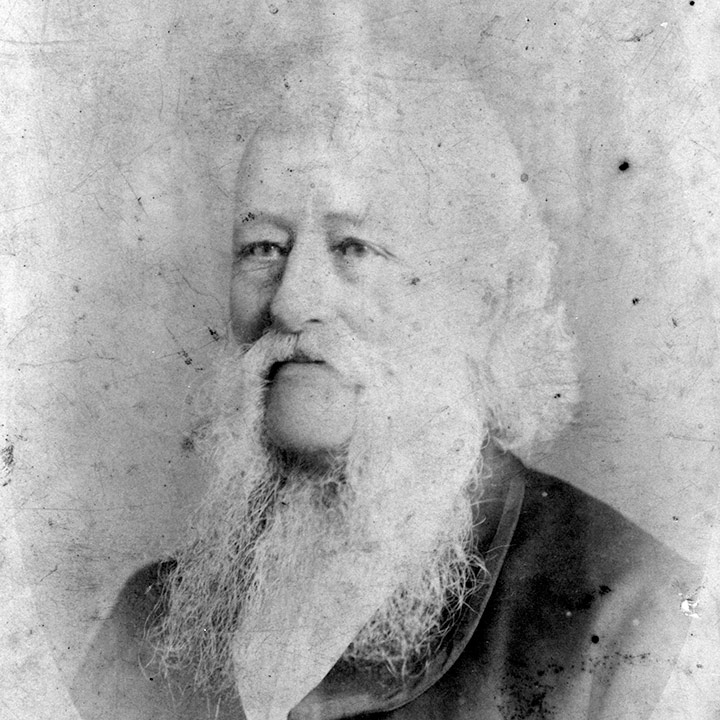
William Colenso
"I was born and raised in the town of Penzance, Cornwall, in the south-west corner of England. My father was a town councillor and earned his living making and..."
Read more